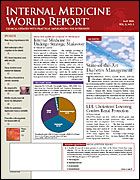New Guidelines Endorse Alternate Drug Classes for HF
Journal of Cardiac Failure
Angiotensin-converting-enzyme (ACE) inhibitors and beta-blockers are the cornerstones of therapy for heart failure (HF) patients with left ventricular (LV) dysfunction. But despite their proven efficacy, these agents remain widely underused, according to the new clinical practice guidelines of the Heart Failure Society of America (HFSA) that have been published in the (2006;12:10-38).
The first HFSA guidelines were released in 1999. The new guidelines provide clinical recommendations beyond the pharmacologic treatment of chronic symptomatic LV dysfunction. They address the full spectrum of the evaluation and management of HF, including acute HF and HF in special populations.
The recommendations include a detailed evaluation of patients for vetricular dysfunction and HF, including those at risk of developing HF (Table 1), those suspected of having HF based on signs and symptoms or incidental evidence, and those with symptomatic HF.
Determination of plasma B-type natriuretic peptide (BNP) or N-terminal pro-BNP is not recommended as a routine part of the evaluation of asymptomatic at-risk patients, although these tests should be performed in all patients who are suspected of having HF but in whom the diagnosis is uncertain.
Drug Therapy
The guidelines endorse the newer classes of agents, including angiotensin receptor blockers (ARBs), aldosterone antagonists, and the combination of hydralazine and an oral nitrate, as useful therapeutic alternatives (Table 2), but a caution is noted that the use of these drugs increases the complexity of therapeutic decision making, and their clinical roles remain incompletely understood.
The use of ACE inhibitors for the prevention of ventricular remodeling and cardiac dysfunction in patients with coronary artery disease, peripheral vascular disease, stroke, diabetes, and other HF risk factors is supported by evidence from randomized, controlled clinical trials.
Beta-blockers should be used for the prevention of HF and for recurrent myocardial infarction (MI) in patients with previous MI.
In patients who cannot tolerate ACE inhibitors because of cough, clinical trial data support the use of ARBs. Less compelling evidence supports treatment with the combination of hydralazine and an oral nitrate in patients intolerant of ARB therapy.
"Beta-blocker therapy is recommended in the great majority of patients with LV systolic dysfunction, even if there is concomitant diabetes, chronic obstructive lung disease, or peripheral vascular disease," the authors write. "Beta-blocker therapy should be used with caution in patients with diabetes with recurrent hypoglycemia, asthma, or resting limb ischemia."
Aldosterone antagonists are recommended for patients who have New York Heart Association (NYHA) class III or class IV HF from LV systolic dysfunction during treatment with standard therapy including diuretics. Aldosterone antagonists may also be considered in patients with acute MI, LV dysfunction, and clinical HF signs and symptoms who are receiving standard therapy with an ACE inhibitor or ARB and a beta-blocker.
In African American patients with LV systolic dysfunction, the combination of hydralazine and isosorbide dinitrate is recommended as part of standard therapy, in addition to ACE inhibitors and beta-blockers. Diuretic therapy is recommended to restore and maintain normal volume status in patients with clinical evidence of fluid overload.
The role of digoxin in patients with symptomatic LV dysfunction and concomitant atrial fibrillation is firmly established, the guidelines note, but its role in patients with normal sinus rhythm remains controversial. A digoxin dose of 0.125 mg/day is recommended for the majority of appropriate patients; the administration of higher doses for rate control is discouraged.
Aspirin is appropriate in most non-HF patients with ischemic heart disease for whom treatment with anticoagulant and antiplatelet agents is not specifically indicated. Aspirin is not recommended for patients with HF not caused by ischemic cardiomyopathy and who have no evidence of atherosclerotic vascular disease.
Nonpharmacologic Strategies
"Nonpharmacologic management strategies represent an important contribution to HF therapy," write Kirkwood Adams, MD, of the University of North Carolina-Chapel Hill, and colleagues. "They can significantly impact patient stability, functional capacity, mortality, and quality of life."
Increasing recognition of the importance of nonpharmacologic interventions in HF patients is evidenced by extensive recommendations regarding lifestyle, diet and nutrition, and health care maintenance issues. Recommendations regarding sodium restriction, fluid intake, nutrient supplementation, vaccinations, stress reduction, and other interventions are based primarily on expert opinion and data from observational and epidemiologic studies.
Education and counseling of patients and caregivers are critical components of management. Referral to a comprehensive HF disease management program is strongly endorsed, particularly in high-risk HF patients, such as those with renal insufficiency, low output state, multiple comorbidities, or persistent NYHA class II or IV symptoms.
Other sections of the guidelines focus on the role of advance directives and end-of-life care, electrophysiologic testing, the use of implanted devices, and surgical approaches to treatment.
The complete guidelines are available online at www.onlinejcf.com.
